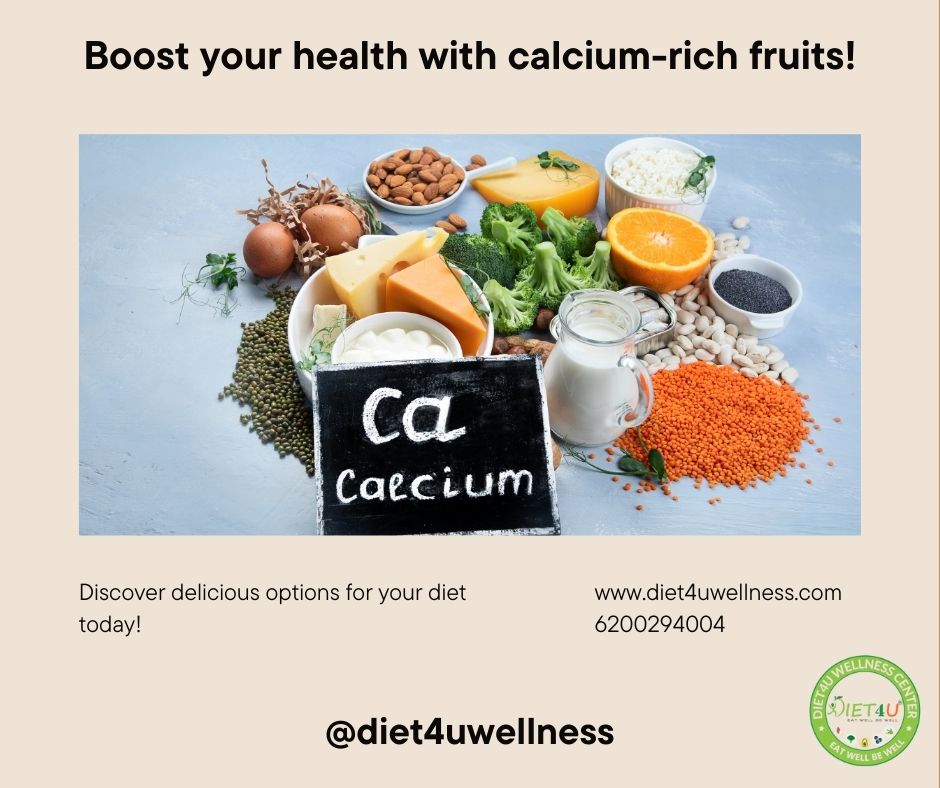
The Best Calcium-Rich Fruits for Stronger Bones
Table of Contents
Calcium is often considered synonymous with dairy products like milk, ghee, butter and curd. On the other hand, fruits are known for their dietary fibres, vitamins, and minerals. But it is high time that we broke this misconception. Some fruits, which are very readily available, are rich in calcium ions and, therefore, could act as a refreshing and hassle-free substitute for all lactose-intolerant people. Oranges, figs, pineapples, apricots, and dates are a few of the fruits that are known to contain a considerable amount of calcium. Therefore, incorporating these readily available fruits into their dietary regime can help fulfil their daily calcium needs. To learn more about Calcium Rich Fruits, visit a website.
What are calcium-rich fruits?
We know that most fruits are not the primary source of calcium, but ones like oranges, figs, and apricots are known to have higher calcium content than normal. Fruits are a great supplement to all the mid-day sweet cravings as they are high in sugar content along with fibres, vitamins and minerals. Also, dried figs, apricots, and dates, when added to the daily oatmeal or bowl of cereal, can readily be added to breakfast for anyone with a sweet tooth. Rather than consuming orange fruit juices available in tetra packs, one can switch to an entire orange as a fruit, which could provide vitamin C, dietary fibre, and obviously calcium.
The best Calcium-rich fruits are listed below.
- Apricots
- Pineapples
- Oranges
- Tangerines
- Figs
- Litchi
- Dates
- Mulberries
- Jackfruit
- Kiwi
These are some of the fruits which are very easily available in the Indian market and are rich in calcium too, so incorporating them into the daily diet would not be difficult, rather will be healthier than before.
Apricots/Dried apricots
Dried apricots are known to contain more calcium-rich fruits than normal ripe apricots. People often prefer sun-drying the fresh apricots and having them dried, as it enhances the taste as well. Dried apricots can be munched on as a healthy, sweet snack option or could also be added to breakfast cereal bowls and smoothies. One could substitute stevia or other refined sugar with a few pieces of dried apricots.
Nutritional value
100gm of dried apricot contains
- 67mg of calcium
- 62.6g of carbohydrates
- 32.2g of protein and 0.5g of fat
Pineapples
Pineapples were initially native to southern parts of America, but now they are being cultivated in all the tropical parts of the world. It is a widely loved fruit, even in the Indian sub-continent; its flavours rule over the dessert and beverage industry and are widely liked by people from all age demographics. Pineapples are not typically sweet, but they do have a hint of sourness due to their vitamin C content. Vitamin C is an antioxidant and is known to boost immunity and prevent minor coughs and colds as well.
Nutritional value
100g of pineapple slices contains
- 13mg calcium
- 21.7g carbohydrates
- 1g protein and 2.3g fat
Oranges
This is a tropical and sub-tropical fruit that is widely cultivated even in India. Oranges are known for their high vitamin C content and are a fruit mainly available during the winter months in India. Its high antioxidant properties help boost immunity, maintain good and hydrated skin, and promote wound healing.
Nutritional value
100g of orange slices contains
- 43mg calcium
- 15.4 g carbohydrate
- 1.2g protein and 3.1g fat
Tangerine
A lot of people confuse tangerines with oranges based on their outer appearance, colour and morphology, but they are two completely different fruits altogether. Tangerines, like oranges, are also rich in vitamin C, which acts as a wonderful antioxidant to boost one’s immunity, skin, gut health and even seasonal colds. Being high in antioxidants, they can decrease the oxidative stress built up during normal metabolism of the body. It also contains a high amount of dietary fibre to help with proper gut health and regular bowel movement.
Nutritional value
- 100g of tangerine contains
- 37mg calcium
- 12g carbohydrate
- 23mg of Vitamin C and 2g of fibre
Figs
Figs are small fruits with tiny edible seeds, surrounded by white, chewy and tender flesh. This white flesh is consumed in a fig fruit. Figs are an extremely sweet delicacy, often not given the importance that it deserves. It is mainly served as a snaking side with other food on the menu, like fruit smoothies, and is often relished alongside a slice or two of cheese. Not only are calcium figs rich in potassium, magnesium, and dietary fibre, but they are also high in nutritional fibres that prevent constipation.
Nutritional value
100g of figs contains
- 36mg calcium
- 19.2g carbohydrates
- 0.3mg protein and 0.3g of fats
Litchi
These are white, fleshy, tender and sweet fruits covered with a pink rough shell, which has to be peeled off before getting to the fleshy interiors. It is a tropical fruit that has a lot of resemblance to rambutan. Even though it is not found year-round, being a seasonal fruit of the monsoon, it could be a high source of calcium-rich fruits and a few other minerals as well. Like most of the different fruits, even litchi is rich in antioxidants and vitamin C, which help to negate the oxidative stress build-up in the body, thus lowering the risk of chronic diseases.
Nutritional value
- 100g of litchi contains
- 5.2mg calcium
- 1.3g dietary fibres
- 23mg protein and 2g fat
Dates
Dates are a fruit from the dryer and hotter parts of the globe, like the deserts where hardly any other colourful fruits and flowers are seen. These are succulent fruits on date palms. Nowadays, dates are frequently used as a sugar supplement and are all-natural, completely avoiding refined sugar. Dates are added to various types of dishes like smoothies, oatmeal ice creams and other kinds of desserts. Along with calcium, dates are also packed with the wellness of vitamin B, minerals like potassium, magnesium, copper and high dietary fibre, which maintains a regular bowel movement.
Nutritional value
100g of date contains
- 39.2mg calcium
- 74.2g carbohydrate
- 2.4g protein and 0.4g fat
Mulberries
It is an “exotic” fruit and serves as an aspirational fruit for the tier 1 cities of India. However, it is packed with loads of benefits. They can be eaten fresh and dried in the form of jams and pickles as well. Like all other berries, it’s also rich in antioxidants that help reduce inflammation and cholesterol levels and maintain healthy heart health. They have a low glycaemic index, which ensures that the blood glucose level does not go off the roof.
Nutritional value
100g of mulberries contains
- 39mg calcium
- 0.39g carbohydrates
- 1.44g protein and 1.7g fat
Jackfruit
It is a typical summer tropical fruit and is very common in India. It is generally big when fully ripe. It can also be consumed in the raw form as a vegetable (as a meat substitute). When ripe, it has a very distinctive smell which spreads across distances. It has big seeds covered with yellow, sticky flesh around it, which is mainly consumed. It is packed with vitamins A and C along with potassium, magnesium and high calcium-rich fruits. Having antioxidant properties, it helps reduce inflammation, reduce the risk of cardiac diseases, and reduce constipation. Some reports show that jackfruit might possess anti-cancer benefits as well.
Nutritional value
100g of jackfruit contains
- 20mg calcium
- 19g carbohydrate
- 1.4g protein and 0.6g fat
Kiwi
Kiwi is a nutrient-packed fruit boasting high levels of vitamin C, vitamin K, and vitamin E, promoting immune function and skin health. It contains significant amounts of potassium and fibre, aiding in heart health and digestion. Kiwi also offers calcium and magnesium, essential for bone strength and nerve function.
Nutritional value
100g of kiwi contains
- 34mg calcium
- 14.7g carbohydrate
- 1.1g protein and 0.5g fat
How do you consume these Calcium Rich Fruits?
It is best to have these fruits raw and fresh, as they would be in their purest and most natural form possible. Earlier, plucking fruits from their compounds and consuming them seemed very far-fetched; hence, the next best possible way out is trying to get them from the local markets. It would be wise to avoid the packaged fruits that people often opt for via the quick commerce sites; those are usually stored for days, if not months, and are sprayed with preservatives to increase their life span. One should definitely avoid taking the “cut fruits” that are being sold in supermarkets, quick commerce, and even by local vendors. They are far away from being fresh, and it is best to avoid them. One could also consider taking the help of dieticians like Dietician Rukhsana Azhar to get a better and holistic idea.
If one is not able to consume the fruits in raw, fresh form, then they can be diced up into pieces and added to their daily smoothie or oatmeal bowls. This would give the boring oatmeal a refreshing and sweet crunch, enhancing its taste further. One should also consider checking the articles by DIET4U WELLNESS; they often come up with recipes and interesting ways of incorporating nutrition into their daily diet. For more information about calcium-rich fruits, contact us.
FAQs Regarding Calcium Rich Fruits
Can I have fruits and cut off dairy products completely?
No. Dairy products are the largest source of calcium, and sadly, they cannot be replaced by fruits rich in calcium. Yes, if someone does not like consuming dairy much, then they can, with the help of Dietician Rukhsana Azhar Cur, eat a diet chart that would balance the remaining calcium needs with fruits.
Will daily consumption of fruits affect the blood glucose level?
No, generally, fruits have a low glycaemic index, which means even though they taste “sweet” and have natural sugar in them, it doesn’t lead to blood glucose level spikes if eaten in moderation. Hence, diabetic people can also have fruits daily but only as per the diet chart curated by physicians or dieticians.
Will fruits help with my skin problems?
Yes. Most fruits are rich in antioxidants, which means they will cut off the oxidative stress produced in the body and naturally keep the skin and gut health in check.
Can I opt for the local vendors selling cut fruits?
Even though cut fruits are sold very commonly in local markets and fairs and are hassle-free and quick, they are best avoided. Local vendors often cut the fruits long back and sell them throughout the day. Flies and other vectors could easily sit on them and spread diseases, affecting the ones consuming them. Also, they hardly use clean and safe water to clean the fruits; hence, it is best to avoid it.
Which Indian fruits are a rich source of calcium?
This article by DIET4U WELLNESS lists all the readily available Indian fruits which are rich in calcium. Fruits like litchi, guava, papaya, blackberries, and jackfruits are some of the fruits which can be consumed.

Hello My Name is Dt. Ruksana Azhar and I am a certified dietician and providing online & offline services for Weight Management, PCOS/PCOD Management, Diabetes Management , etc. I have 12+ years of experience in the Apollo Hospital Delhi , Max Super Specialty Hospital Delhi, Lilavati Hospital Mumbai and VLCC healthcare Mumbai. I loves to write healthcare and lifestyle related blog. My favorite part of being a doctor is the opportunity to directly improve the health and wellbeing of my patients and to develop professional and personal relationships with them.



